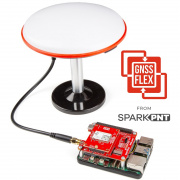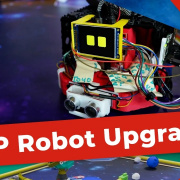Back to "The Future!"
Revisiting an earlier post about The Future and getting a little direction.
A few weeks ago I wrote about the concept of The Future and what has changed about it since the days when we dreamed of flying cars and food pills. I probably spend too much time thinking about it... so I wanted to know what everyone else thought. Turns out, I'm not the only one who's given this some thought (go figure) and a lot of you had good (and not-so-good) things to say about The Future.
It seemed like it might be cool to keep this conversation rolling, so I've asked our directors here at SparkFun HQ to chime in on the subject for your entertainment. Here's what they had to say:
Our Chief Operating Officer, Trevor, chimes in on the blog from time to time. But he spends most of his time making sure that SparkFun stays, well, operational. He agreed in large part with the tone of my post and went on to give a little historical perspective:

I think that in what you’ve written you’ve very accurately explained the situation, with an older generation who thought extensively about the Future as a wonderful place where technology fixed every problem, and read early Asimov and Clarke and maybe some Heinlein here and there being supplanted in more current times by those who think of the future (with a lower-case f) as having sky the color of television tuned to a dead channel.
In the post WW2 boom, and going AT LEAST until Kennedy was assassinated, every year brought “bigger and better” (yes, those scare quotes are deliberate) cars, appliances, houses, hi-fis, etc. It was a time of heady optimism, at least for the middle and upper classes in the US.
After the Kennedy assassination, Watergate, the Vietnam War, Three Mile Island, Chernobyl, 9/11, and all the way to the current NSA revelations, it’s difficult to remember that technology actually DOES improve our lives to an extent every year. We view the past through rose colored glasses, forgetting or glossing over the many bad parts and taking for granted how the march forward of technology has really helped us today.
So, we have the wide perception that the past was better and the future is dirty, juxtaposed on the reality that although bad things are happening all the time, overall the future looks really bright, and the past was not as good.
Lindsay, our Director of Education was a research scientist in her pre-SparkFun life. Now she spends her time trying to get microcontrollers into the hands of young children. You may remember her post about her Arrested Development NeverNude shorts. She takes a very pragmatic stance on The Future:

Admittedly, this is not my territory as aside from the science fiction running through various Vonnegut novels and a few of the dystopian classics, I'm not much of a sci-fi buff. In fact, I'm not sure if I've ever really thought of the the future with a capital 'F' other than a basket to which we can toss ideas of a better or worse life depending on the mood.
I spent most of my adulthood as a research scientist leading up to my days at SparkFun. The problems of the present are big enough that I wasn't too focused on the Future other than subconsciously using it as a light at the end of the tunnel. I'm sure somewhere in the back of my head I wondered what the research laboratory of the Future would look like knowing how different it was from the great scientists who paved the way for me to run powerful assays in just a matter of hours. I knew that there would be scientists that would revolutionize all areas of the sciences through new tools, but I genuinely didn't see myself in that camp. I was a humbled scientist.
However, since transitioning away from the laboratory and settling into life at SparkFun I am ever impressed by the citizen science that is brewing. By improving the accessibility and affordability of the tools (often through openness) we see amazing breakthroughs coming from all ages, races, genders, and from regions of the world that haven't had the opportunities to create and hack with these technologies. I don't think the Future will spare us from the perils of war, disease, and various hardships. The advances in technology will likely lead to powerful tools finding their way into dangerous hands, but I am hopeful that the advances in citizen science and participation will lead to rapid advances in areas that will greatly improve our lives and bring about better balance in the areas that have been perilously skewed over the last few decades.
In much the same way, Nate (El Queso Grande) is wary of a vision of the future which he sees as fantastic, but impressed by the massive leaps that we've already made:

'The Future' was something before my time. I know of it as that era of retro sci-fi, and I know it had an impact on my parents/grandparents but by the time I was a kid I think technology was changing so quickly, and coming at them so fast, that people forgot to think about what was coming.
I often discount 'the future' as vaporware. I've learned to not buy in to the idea that cutting edge medical cures are just around the corner, or that energy will be too cheap to meter, or that we'll control the weather.
But I am pretty damned impressed by how quickly LED light bulbs can fundamentally change many times (models, styles, colors, brightness) over a few months at the store, all the while dropping in price. Maybe it's just a morning for the jaded businessman.
That said - there is something to the force that drives us. I wouldn't call it The Future but I do think there is a very nice, quiet, grass roots change going on with microcontrollers and embedded systems. That's what they were called 5 years ago. Now it's called Arduino and blinkys. What drives me is that what was unapproachable and set me apart from my friends is now becoming cool/fun/easy enough that my friends are doing it too. I'm all for that.
Of course, the farthest into the future that Nate can see right now is probably the construction of our new HQ. Somehow, he still finds time to do things like investigate our in-stock rates and testify in front of the US Judiciary.
Our Director of IT, Chris, makes a really compelling point about how innovation may have moved into scales that are harder to visualize. Is it possible that we're still working on The Future but it's either too small or too huge for popular culture to portray effectively? Here's what he has to say about it:

The Future to me - at least the fantastic imaginative side of it - seems constrained to two realms decidedly outside of standard human perception: the very big and the very small.
The very big Future is stuff on a global scale and beyond our planet. Huge energy capturing devices like offshore wind turbines and the space ships of tomorrow that are in testing today. While some of these technologies are fathomable in comparison to my physical self (unlike, say, a massive solar sail…), these are technologies that will be deployed where I can’t see them. Like in the middle of the ocean or out in space, not in my neighborhood (like the flying car) or holstered to my hip (like a laser blaster).
The very small Future is the feeling I get when I watch a program like the NOVA Making Stuff Series. Metamaterials that do amazing things. At human scale they look innocuous (perhaps with the exception of broad-spectrum invisibility material, which would look like whatever’s behind it). These are the things that, when scaled up to human size, give us devices that behave like magic but we just expect them to work and go on with our lives. I’ve definitely fallen into that trap - it’s a part of the human condition - but whenever I read about or see images of what’s going on at the nano-scale level the amazement and wonder returns, because it is and will remain utterly outside of my experience.
This is where The Future of the past, like what you see inside the big ball at Epcot, falls flat. It was the The Future at human scale. But that’s not where the truly astounding advances will happen. Especially if we ever plan on being a Type I Civilization or better - the scale imposed by our physiology is as limited as the chunk of the spectrum imposed by our organic eyeballs. We’ve explored it so thoroughly that what wonders remain uncovered are few and far between, though not absent. Our exploration of other scales is really only starting to heat up and that’s where the best and most awe-inspiring advances of The Future lurk, waiting to be found and engaged.
Chris doesn't get a lot of time to hit the news page here but when he does, he hits it hard. Check out this great post about taking inventory at SparkFun!
Then there were some people who were less optimistic, like our very own Pete Dokter of According to Pete fame:
fair enough.
As I watched the comments pour in for my original post, there were a few that caught my eye. Here's what some of you had to say about your experience with The Future. Avid commenter HelicopterGuy theorizes that The Future may just be too far away for us to care about anymore and is looking to todays prominent minds to reinvigorate our spirit of innovation:

It seems to me as if we as a society have become so wrapped up in instant gratification that we have stopped looking to the future the way we used to. And the collective enthusiasm we as a society once shared has been replaced by divisiveness. And even our entertainment - remember the thoughts and dreams that Star Trek inspired? - has been replaced with reality TV, which inspires absolutely no one to try to achieve anything great. I think one shining beacon of hope is Elon Musk. He imagined electric cars for everyone, refueled by free, solar-powered charging stations, as well as space flight the way we all pictured it - and has set about to making them a reality. I agree with you, it certainly is time for a paradigm shift. And i think that visionaries like Musk can help to re-inspire us to once again dream of and reach for The Future.
Another SparkFun regular, scharkalvin, gauges Sci-Fi's track record for predicting the actual future and hypothesizes that we've tamed The Future on account of more immediate concerns:

Science fiction has tended to be too optimistic in some places, and not optimistic enough in others. But sometimes they got it right. In the very first foundation novel published back in the 50’s Asimov predicted the pocket calculator. He was probably the only author that ever got THAT one right. Some future predictions were right on technically, but not practical or too dangerous in reality. Personal helicoptors were long seen as the future, but the vision failed due to the expense of the machines and how difficult they are to fly! Not every fixed wing pilot makes the transistion to rotor wing, because it takes talent (and lots of expensive hours in type)!
Back in the 50’s and 60’s the fear was we’d destory ourselves in a big atomic blast. Now we worry that we’ll simply slowly make the planet unable to support our species life kind and number. We’ve also come to realize just how lucky we’ve been not to have been wiped out by a rouge rock from space, or a super volcano eruption. So maybe we’ve tamed our vision of the future somewhat because we are now afraid that there might not be one.
Finally, insertBillHere learned how to pick out the practical from the fantastic while sorting through the culture of futurism. That ability has left him with a positive point of view about participating in The Future:

Growing up, I remember many of these “futurisms.” But I was looking at ten- and twenty-year-old magazines. I was living in that future, and those things didn’t exist. So early on I became jaded.
As I grew up, I discovered I was wrong. Some of these magical things did, in fact, exist. Very few of them were in those magazines, however. More of them followed from period literature (pocket calculators and geosynchronous satellites) than from gaudier magazines. So I began to read with an active filter, looking at what could actually be done, and how new products from engineering journals could enable the dream products of yesteryear. I tried building things that worked, rather than simply dreaming about them, and found out how hard that really is.
These days I’ve joined a local hacker-space. I have a background in electronic hardware and cloud computing, and I look at projects the group wants to engage with an eye to, “how can we make this happen with available technology?” I used to dream about the future and how technology could make the future happen; now I live in the future and make it happen every day.
Close enough.
Close enough, indeed.







